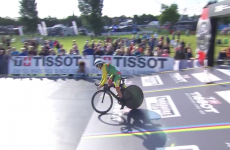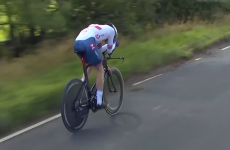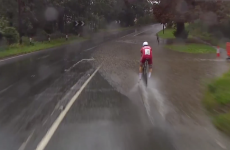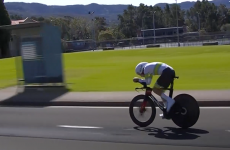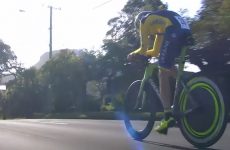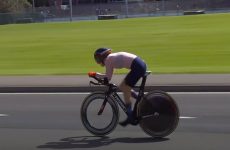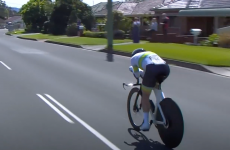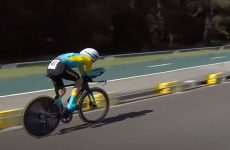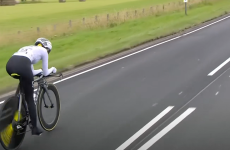Description
September 19, 2012
Individual Time Trial – World Championships 2012 – Heerlen – Valkenburg : 45,7 km
The Men’s time trial of the 2012 UCI Road World Championships cycling event took place on 19 September 2012 in Limburg,
Show more...
September 19, 2012
Individual Time Trial – World Championships 2012 – Heerlen – Valkenburg : 45,7 km
The Men’s time trial of the 2012 UCI Road World Championships cycling event took place on 19 September 2012 in Limburg, Netherlands. The riders completed a course that was 46.2 km (28.7 mi) starting from Heerlen and finishing in Valkenburg. There were three named climbs including the famous Cauberg that features in the Amstel Gold Race.
Tony Martin (Germany) took his second straight time trial world championship title, but it couldn’t have been much closer. He visibly slowed in the final kilometers and beat Taylor Phinney (United States) by a mere 5.37 seconds. Third place went to dark horse Vasil Kiryienka (Belarus).
Vuelta a Espana victor Alberto Contador (Spain) was expected to challenge for the title, but fell back early on, and finished the race as ninth, over a minute down. Martin, who as defending champion, started last, passed the Spaniard after the second intermediate time check.
“After a year with so may ups and downs and bad luck, there was just one way to make the season good and that was by taking the title today,” Martin said. “After breaking my hand on the first stage in the Tour de France it was pretty hard to get ready for the Olympics, but I handled that situation well, and I got the silver medal in London. That gave me a lot of morale.”
Martin and Phinney, who started four minutes ahead of the German, delivered an exciting two-man race. The young American had the lead at the first time check (14.3km), by four seconds over his German rival. Martin charged back to lead by 13.26 seconds at the second time check (29.7km). Phinney then cut that lead to 8.86 seconds by the final intermediate time check (38.4km).
But by that point there was one more hurdle to come – the dreaded Cauberg. Boasting 1200 meters and a 5.8% gradient, it had defeated Phinney in last Sunday’s team time trial and cost his BMC Racing Team the gold medal, as he struggled up it.
He seemed to have learned his lesson though, and took the climb smoothly. Martin, a proven climber, had equally few problems with it, but seemed to run out of steam after the climb. Going visibly slower and with difficulty, his sure win came into doubt, but he held on to take the title by only a handful of seconds.
“Just at the top of the Cauberg, I was full, full sprinting. It was the longest 1,000 metres of my career,” Martin said afterwards. “My legs were full of lactic acid, but I had to continue and when I saw the time at the finish, I saw that I was just in front.”
One corner, shortly after the second time check, proved to be important. Although the race was run in sunshine, it had rained earlier and portions of the road were wet. Italy’s Marco Pinotti took the left hand turn and his wheel slipped out either on rough pavement or wet road markings. He hit the pavement and jumped back up quickly, only to slow down in a few hundred meters and climb sadly from his bike. Italian national trainer Paolo Bettini consoled his rider, who looked as if he may have a broken collarbone.
Fans held their breath as the remaining four riders took the same corner. Contador was the penultimate rider, followed – and followed closely – by Martin. Only a few hundred meters later, the German passed his two-minute man, officially putting an end to Contador’s hopes for a medal.
Wet roads and sunshine
It was a lovely autumn day in southeastern Netherlands. Overnight rains left many of the roads wet, but there were no puddles and blazing sunshine greeted most of the riders. Three climbs in the “Dutch Alps” were along the way, with the Cauberg once again coming near the finish.
There was no early dominant leader, with the lead changing hands often until Dmitriy Gruzdev of Kazakhstan set a best time of 1:00:35.20. He sat in the hot seat for a long time, as he had started as number 40, and wasn’t bounced out of it until number 28, Vasil Kiryienka of Belorussia topped him by 11.45 seconds. Kiryienka’s time was good enough for the bronze medal, while Gruzdev finished a more than respectable sixth.
The favourites then took to the road, and Phinney was resplendent in the American stars and stripes jersey in the sunshine. Contador was highly concentrated as he started off, but to no avail.
Martin took a drink just moments before his start and looked restless, as if he was anxious to get the show on the road.
Phinney blasted through the first time check, 15 seconds faster than Gruzdev’s best time, and Martin was unable to beat him. Meanwhile, there was an omen of things to come as Contador passed through in 15th, nearly 20 seconds down.
The cat-and-mouse game between Martin and Phinney continued the whole race, with Martin looking to have taken the upper hand with the best time at the second time check. Shortly thereafter, he caught and passed Contador.
“Then when Tony Martin went past me, that was tough to handle,” the Spaniard admitted. “I knew he was on for a winning time, I tried to keep close to him but it was impossible. He was turning a massive gear, it was a false flat, and he was still heading away from me.”
“I just tried to keep him at a reasonable distance and finish ok because I knew that a medal was not a possibility.”
Phinney was first the break the 50-minute barrier at the third and final intermediate time check, but Martin topped him there too, although by a lower margin than earlier.
But the Cauberg was still to come. Martin is a proven climber and Phinney had enormous difficulties with the climb during the team time trial. This time, however, with no extra-speedy teammates to pull him out of his rhythm, he mastered the legendary climb and burst his way to the finish line, nearly catching Sweden’s Fredrik Kessiakoff, who had started just ahead of him.
Phinney then crossed the finish line in 58:44.13, the first man to break the one-hour mark. He didn’t have much time to enjoy the hot seat, although the finish ended up being much closer than expected.
“I’m not a U23 any more, and these opportunities don’t come around every single day,” said Phinney. “Winning a world championships is career and life changing, so to be five seconds away from that is a pretty big disappointment. It’s also a big motivation booster for the winter and going into next year.”
Martin unexpectedly lost time along the way, whether on the Cauberg or the few kilometers afterwards, and instead of sailing confidently in to his second world time trial title, he had to obviously force himself over the last few hundred meters.
He made it, though, crossing the finish line a mere 5.37 seconds faster than Phinney, before collapsing exhausted on to the tarmac.
Results :











